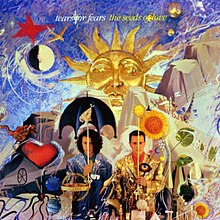The Seeds of Love
| The Seeds of Love | ||||
|---|---|---|---|---|
 |
||||
| Studio album by Tears for Fears | ||||
| Released | 25 September 1989 | |||
| Recorded | 1986–1989 | |||
| Length | 49:31 (original) 65:18 (1999 reissue) |
|||
| Label | Fontana/Mercury/Phonogram | |||
| Producer | Tears for Fears, Dave Bascombe | |||
| Tears for Fears chronology | ||||
|
||||
| Singles from The Seeds of Love | ||||
|
||||
| Professional ratings | |
|---|---|
| Review scores | |
| Source | Rating |
| AllMusic | |
| Chicago Tribune | |
| Los Angeles Times | |
| Rolling Stone | |
The Seeds of Love is the third studio album by British new wave band Tears for Fears, released on 25 September 1989.
The album, which reportedly cost over £1 million (GBP) to produce, retained the band's epic sound while showing increasing influences ranging from jazz and blues to The Beatles, the latter of which is most evident on the hit single "Sowing the Seeds of Love".
The Seeds of Love was a big international success, entering the UK Album Chart at number one and reaching the top ten in numerous other countries including the U.S. It has been certified Platinum in several territories including the United Kingdom, the United States, France, Germany, Canada, and the Netherlands. Despite its success, it would be the last album that band members Roland Orzabal and Curt Smith would work on together for over a decade.
The first song composed for the album was "Badman's Song" (originally titled "The Bad Man Song"), written during the band's 1985 world tour after Orzabal overheard two members of the tour personnel maligning him in a hotel room one night. The song was co-written by Orzabal with keyboardist Nicky Holland, who was touring with the band throughout 1985. Holland would go on to play an integral part in the writing and recording of The Seeds Of Love album, much as keyboardist Ian Stanley had on the band's previous album.
Recording sessions for the album began in late 1986 with producers Clive Langer and Alan Winstanley, but Orzabal and Smith were unhappy with the results and so the recordings were scrapped in early 1987. Chris Hughes (who had produced both the previous Tears For Fears albums) was then brought back into the fold, but again conflicts arose over the direction of the new material. Orzabal in particular had grown weary of composing and playing music using machines and sequencers, as the majority of Tears For Fears' music had been up to that point, and was striving for something more organic and a different way of working.
...
Wikipedia
